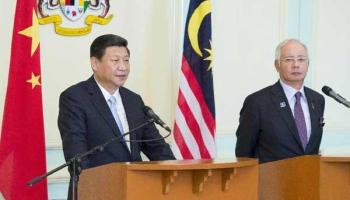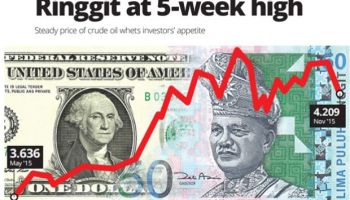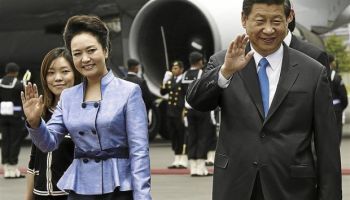https://youtu.be/da8vJ6-iOXE
China says it will never seek hegemony in national defense white paper
https://youtu.be/_AammHB8uZo
https://youtu.be/5iBg-aZ9dOE
China issues a white paper titled "China's National Defense in the New Era," the first white paper on national defense since the 19th National Congress of the Communist Party of China in 2017. CGTN brings you the latest information live from the press conference.
https://youtu.be/aOmOV7g3gBY
The PLA's expanding role in the New Era
https://youtu.be/yOe_H7NaQDk
Chinese governance highly distinctive, remarkably effective: Martin Jacques https://youtu.be/b6MFGw91JDk
The Point: U.S. report smears Chinese military’s aid efforts
https://youtu.be/c2R4okyiWtA
Voyage of Chinese PLA Navy in new era
https://youtu.be/9KbEGFRnxlg
China says it will never seek hegemony in national defense white paper
https://youtu.be/_AammHB8uZo
https://youtu.be/5iBg-aZ9dOE
China issues a white paper titled "China's National Defense in the New Era," the first white paper on national defense since the 19th National Congress of the Communist Party of China in 2017. CGTN brings you the latest information live from the press conference.
https://youtu.be/aOmOV7g3gBY
The PLA's expanding role in the New Era
https://youtu.be/yOe_H7NaQDk
Chinese governance highly distinctive, remarkably effective: Martin Jacques https://youtu.be/b6MFGw91JDk
The Point: U.S. report smears Chinese military’s aid efforts
https://youtu.be/c2R4okyiWtA
Voyage of Chinese PLA Navy in new era
https://youtu.be/9KbEGFRnxlg
A white paper titled "China's National Defense in the New Era" released by the State Council Information Office Wednesday expounded on the missions and tasks of China's armed forces.
China's armed forces endeavor to provide strategic support for consolidating the leadership of the Communist Party of China and the socialist system, safeguarding national sovereignty, unity and territorial integrity, protecting China's overseas interests, and promoting world peace and development, said the white paper.
The missions and tasks of China's armed forces were laid out in seven aspects:
-- Safeguarding national territorial sovereignty and maritime rights and interests;
-- Maintaining combat readiness;
-- Carrying out military training in real combat conditions;
-- Safeguarding interests in major security fields;
-- Countering terrorism and maintaining stability;
-- Protecting China's overseas interests;
-- Participating in disaster rescue and relief.
Source link
Can China become a military superpower?
https://youtu.be/OEAwszKIIto
馬來西亞認清形勢!373億訂購中國戰艦!還有更大軍購訂單!
https://youtu.be/NAGh50bTxkw
殲 20變試驗機!中國六代機關鍵技術突破!美國這次真的惱羞成怒!
https://youtu.be/hxDF4GdZZEw
Is an innovative China a threat to the world?
https://youtu.be/RpQh5Y36YXw
RELATED ARTICLES:
- Historic strides made in strengthening Chinese armed forces: white paper
- China keeps active military force at 2 mln after downsizing: white paper
- China establishing modernized weaponry, equipment system: white paper
Peace paramount in defense white paper
We need to be wary of attempts of certain Western forces to split China by utilizing the secessionists. We should be fully prepared. If needed, we would resort to force to address the Taiwan question, though we hope to realize peaceful reunification.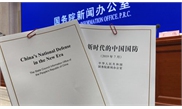
China's military strong but defensive
The West led by the US should understand that China can't be intimidated. Past clashes between imperialist powers were often triggered by competing for colonies and overseas spheres of influence. But China has no colony and is not interested in seeking spheres of influence. All the challenges it faces happen in China's doorway. But it is wise to avoid squeezing a military power.PLA establishes modern weapons, equipment system: white paper
The Chinese military is establishing a modernized weaponry and equipment system by commissioning the likes of Type 15 tanks, Type 052D destroyers, J-20 fighters and DF-26 intermediate and long-range ballistic missiles, according to a white paper issued by defense ministry on Wednesday.White paper gives overview of reshuffled armed forces
A white paper titled "China's National Defense in the New Era," released Wednesday by the State Council Information Office, gave a systematic introduction to the reshuffled People's Liberation Army (PLA) and the People's Armed Police Force (PAP) troops.Source: Xinhua | 2019/7/24 13:20:26
China's defense expenditure reasonable, appropriate: white paper
China's defense expenditure is reasonable and appropriate, said a white paper released Wednesday by the State Council Information Office.Source: Xinhua | 2019/7/24 13:19:59
White paper states global significance of China's national defense
The global significance of China's national defense in the new era is actively contributing to building a community with a shared future for mankind, a white paper said Wednesday.Source: Xinhua | 2019/7/24 13:16:04
White paper cites 'never seek hegemony' as China's natl defense pledge in new era
China unveiled on Wednesday its first white paper on national defense since the 19th National Congress of the Communist Party of China and the start of China's latest military reform. It shows that the Chinese military is a force of peace determined to safeguard the country's sovereignty and peaceful development, and its development will never lead to hegemony.Source: Global Times | 2019/7/24 12:07:13
White paper explains fundamental goal of China's national defense
Resolutely safeguarding China's sovereignty, security and development interests is the fundamental goal of China's national defense in the new era, said a white paper released by the State Council Information Office on Wednesday.Source: Xinhua | 2019/7/24 11:18:31
China pursues nuclear strategy of self-defense: white paper
China pursues a nuclear strategy of self-defense, the goal of which is to maintain national strategic security by deterring other countries from using or threatening to use nuclear weapons against China, a white paper said Wednesday.Source: Xinhua | 2019/7/24 11:06:28
Peace an irreversible trend, but world not tranquil place: white paper
Peace, development and win-win cooperation remain the irreversible trends of the times, but the world is not yet a tranquil place, said a white paper on China's national defense released Wednesday.Source: Xinhua | 2019/7/24 11:05:57
China will never seek hegemony: white paper
China will never seek hegemony, expansion or spheres of influence, said a white paper released by the State Council Information Office on Wednesday.Source: Xinhua | 2019/7/24 10:56:16
China adheres to defensive national defense policy: white paper
China adheres to a national defense policy that is defensive in nature, said a white paper titled "China's National Defense in the New Era" released on Wednesday.Source: Xinhua | 2019/7/24 10:55:29
China issues white paper on national defense in new era
China on Wednesday issued a white paper to expound on its defensive national defense policy in the new era and explain the practice, purposes and significance of China's efforts to build a fortified national defense and a strong military.Source: Xinhua | 2019/7/24 10:05:51
China, Brunei see deepening ties between defence ministries, militaries: Chinese defence official
Brunei's Ministry of Defence and China's Ministry of National Defense, the Royal Brunei Armed Forces and the People's Liberation Army (PLA) have seen expanding and deepening contacts throughout the years, Wu Geng, Defence Attaché of the Embassy of the People's Republic of China in Brunei Darussalam said on Monday night.Source: Xinhua | 2019/7/23 13:50:38
PLA teams prepare for International Army Games
Teams from the Chinese People's Liberation Army (PLA) are preparing for the upcoming International Army Games (IAG) scheduled to start on August 3 across 10 countries, which this year will include a joint team from the PLA's Naval Aviation and Air Force for the first time.Related post:

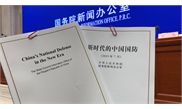



 Pivotal moment: The PM in talks with President Xi Jinping during a meeting at Diaoyutai state guesthouse in Beijing.
Pivotal moment: The PM in talks with President Xi Jinping during a meeting at Diaoyutai state guesthouse in Beijing.












